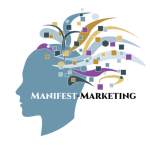🌟 Introduction
Artificial Intelligence (AI) has moved beyond being a futuristic concept it’s now a cornerstone of modern business innovation. From streamlining operations to generating actionable insights, AI is reshaping the way organizations think, create, and grow. AI’s true strength lies in its ability to handle complex tasks quickly and accurately, freeing human teams to focus on creativity, strategy, and meaningful collaboration. Companies working with Manifest Marketing are discovering how AI can transform their workflows, unlock hidden potential, and deliver smarter solutions for their clients and teams. Businesses adopting AI aren’t just keeping up; they’re setting the pace. The most successful organizations leverage AI to enhance productivity, foster innovation, and achieve measurable results
🤖 Understanding the AI Revolution
AI isn’t just about robots or self-driving cars it’s about intelligent systems capable of learning, adapting, and improving processes across every aspect of business. Here’s why AI is transforming the business landscape:
- Automation of Repetitive Tasks: Mundane tasks like scheduling, data entry, and reporting can now be automated, allowing teams to dedicate time to strategic initiatives.
- Insight-Driven Decisions: AI processes massive datasets to reveal trends and patterns, empowering leaders to make more informed decisions.
- Enhanced Customer Engagement: AI enables hyper-personalized communication, helping businesses tailor experiences to individual customer needs.
- Scalable Innovation: AI systems grow alongside the business, adapting to evolving markets and expanding operational requirements.
AI adoption isn’t just a trend; it’s a strategic move that separates forward-thinking organizations from the rest.
💡 AI and Creativity: Unlocking New Possibilities
One of the biggest misconceptions about AI is that it replaces creativity. In reality, it enhances it. AI tools can analyze massive datasets to reveal hidden patterns, freeing creative professionals from manual number crunching. This allows them to focus on crafting strategies, designing experiences, and telling stories that resonate.
For example, marketing teams use AI to generate insights into customer preferences, identify emerging trends, and even spark new campaign ideas. By analyzing what works and what doesn’t AI helps creatives fine-tune their work with precision and flair.
Platforms that integrate AI into daily workflows demonstrate how technology and creativity can collaborate rather than compete. By automating mundane tasks and providing deep insights, these tools empower teams to explore innovative solutions, test new concepts, and craft experiences that truly resonate with their audiences. The result is a harmonious balance between data-driven strategy and imaginative execution.
⚙️ Automation: The Engine of Productivity
Automation is at the core of AI’s business applications. It transforms operational workflows, eliminating repetitive and time-consuming tasks, while improving accuracy and speed.
Key benefits of automation include:
- Error Reduction: Automation minimizes human mistakes in repetitive processes, ensuring higher consistency.
- Time Optimization: Teams can focus on high-value projects rather than manual, administrative work.
- Cost Savings: Automation reduces operational expenses by improving efficiency and reducing waste.
- Enhanced Collaboration: With routine tasks managed by AI, teams can work together more effectively on strategic initiatives.
By leveraging automation, companies create more agile, responsive, and productive environments, enabling faster decision-making and higher-quality outcomes.
📊 Data as a Strategic Asset
Data has always been valuable, but AI transforms it into actionable intelligence. AI doesn’t just collect information; it analyzes, predicts, and recommends the best course of action.
Businesses can use AI-powered analytics to:
- Predict customer behavior and market trends
- Optimize resource allocation and inventory management
- Measure campaign effectiveness in real time
- Generate detailed reports and insights to guide strategic planning
With AI handling the heavy lifting of data analysis, companies can focus on interpreting insights and applying them creatively. This shift from reactive decision-making to proactive strategy is what sets AI-driven businesses apart.
🌱 Enhancing the Human Touch
Even in an AI-driven world, human ingenuity remains irreplaceable. While AI excels at processing information and identifying patterns, humans provide empathy, context, and intuition.
The combination of AI and human insight results in better decision-making, more innovative solutions, and a workplace culture that encourages creativity. Employees often report feeling more empowered and motivated when routine tasks are automated, allowing them to contribute meaningfully to strategy and innovation.
💡 Transforming Teams Through Learning
Adopting AI successfully requires not just technology but also knowledge. Immersive workshops and hands-on training help teams understand AI applications and integrate them effectively into workflows.
These sessions focus on practical implementation, enabling participants to:
- Design and deploy automated workflows
- Leverage AI for predictive analytics and reporting
- Enhance collaboration across teams using AI tools
- Transform data into actionable business insights
By learning how to use AI in real-world scenarios, teams become more agile, confident, and capable of driving impactful results.
🌐 A Platform for Smarter Business
Some platforms have taken the lead in helping businesses harness AI effectively. By combining automation, analytics, and workflow optimization, they empower teams to unlock productivity and creativity like never before.
Through interactive workshops and guided sessions, businesses can explore AI applications tailored to their specific needs. Participants gain the skills to generate insightful reports, automate processes, and make smarter, data-driven decisions.
Businesses report feeling “energized” and “inspired” after these sessions, noting that AI isn’t just a tool but a collaborative partner that amplifies their creativity and strategic thinking.
By enabling teams to focus on high-value activities, these platforms help organizations reimagine their approach to growth and innovation.
📈 Practical Applications of AI Across Industries
AI isn’t limited to one sector it’s applicable everywhere. Here’s how different industries are using AI to transform operations:
- Marketing: AI-driven analytics uncover consumer trends, optimize campaigns, and generate personalized content for target audiences.
- Finance: Predictive models forecast revenue, analyze risks, and streamline financial reporting.
- Healthcare: AI assists in diagnosis, patient management, and operational efficiency.
- Retail: Inventory management, personalized shopping experiences, and demand prediction are enhanced through AI.
- Customer Service: AI chatbots and virtual assistants provide instant support, improving satisfaction and response times.
The versatility of AI makes it a valuable asset for businesses of all sizes, enabling innovation and efficiency simultaneously.
💬 The Shift in Business Mindset
AI adoption isn’t just about technology it’s a mindset shift. Companies embracing AI are cultivating cultures of curiosity, experimentation, and continuous improvement.
Employees are encouraged to explore how AI can enhance their work rather than replace it. The outcome is a workforce that is more engaged, productive, and confident in using technology to achieve strategic goals.Forward-thinking organizations view AI as a collaborator a partner that augments human capabilities rather than competing with them. This mindset fosters creativity, innovation, and smarter decision-making across the board.
🔮 Future Trends in AI for Business
The potential for AI is only expanding. Emerging trends include:
- Hyper-Personalization: Tailoring services, products, and communication to individual customers in real-time.
- Predictive Intelligence: Forecasting trends and potential challenges before they occur.
- Intelligent Automation: Creating fully autonomous workflows that anticipate needs and optimize outcomes.
- Collaborative AI: Enhancing teamwork by providing insights, suggestions, and predictive analytics to guide group decisions.
Businesses that adopt these trends early are positioning themselves as leaders in innovation and customer experience.
🌟 Conclusion: Embracing Intelligent Growth
The integration of AI into business is no longer optional it’s essential. By combining automation, data insights, and creative collaboration, organizations can redefine productivity, innovation, and customer engagement.Platforms offering immersive AI workshops and tailored solutions demonstrate how technology and strategy can work together seamlessly. They help businesses unlock creativity, streamline workflows, and make data-driven decisions that drive measurable growth.In the end, AI isn’t about replacing people it’s about empowering them. With the right approach, technology becomes a partner in innovation, enabling businesses to work smarter, think bigger, and achieve more than ever before.






Comments